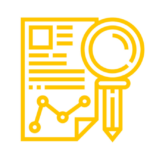- What is the Community EdData Hub?
- What is a research request/question?
- What information is available?
- What if I want information that is not listed above?
- What types of projects or work can be supported by the CEDH?
- Is there support so that I can make sure my constituents, partners, and/or team understand the data I’m providing?
- Is there support for data visualizations and other content creation?
- How much does it cost?
What is the Community EdData Hub?
The Community EdData Hub (CEDH) is an initiative by A+ Colorado to help different community groups and organizations in Colorado answer research questions about education in Colorado that are important to their work by supporting them with data or research help for a significantly reduced cost.
What is a research request/question?
A research request can be thought of as any information that you want to learn about a system and an outcome. The more specific the question or information requested is the easier it will be to find the right data to answer the question.
If you aren’t sure exactly how to frame your research question we are happy to discuss it with you. A helpful start is to think about A) what is your population of interest (e.g. low-income students) B) what is your outcome of interest (e.g. academic achievement) and C) are there particular geographic bounds that interest you?
😑 Good: Which schools are best serving low-income students?
🙂 Better: Which schools in Jefferson County school district are best serving elementary and middle school students? Or, Which schools in Jefferson County school district are best serving high school students?
😀 Best: In which schools in Jefferson County did low-income elementary and middle school students perform best on English Language Arts last year? Or, In which schools in Jefferson County are low-income elementary and middle school students improving the most rapidly within a year?
What information is available?
Information is released in datasets. We break down which information is available by “outcomes”, which is the number you don’t know and want help finding, such as achievement or number of students in a grade, school and so on. Then there are “disaggregation levels” and “years” which are simply parameters that limit which students we are looking at and on which years. The list below may not be exhaustive. Please contact us at EdDataHub@apluscolorado.org if you don’t see an outcome or parameter that includes your question.
|
Data Type |
Measures | Disaggregation Levels |
Years Available |
|
School & District Information |
|
District Level or School Level (depending on the measure) | Depends on measure |
|
Academic Outcomes |
*Measured by the Colorado Measures of Academic Success (CMAS) for Elementary and Middle Schools and the PSAT and SAT for High School students. There are also historical results on past assessments like CSAP and ACT. |
Grade level, Elementary/Middle/High School Level, Gender, race/ethnicity, English language learners, free/reduced priced lunch status, homelessness status, students with disabilities, rural/urban or town setting, school governance type | Years available: 2015-Present for CMAS, 2004-2014 for historical assessments
Graduation and Matriculation available for class of 2009-present |
|
Culture & Learning Opportunities |
|
District Level or School Level (depending on the measure); race/ethnicity, gender (depending on measure) | Depends on measure |
What if I want information that is not listed above?
Please reach out to us if you want information that is not listed above. We may still be able to help you or help put you in touch with other partner groups that have access to different information.
What types of projects or work can be supported by the CEDH?
The CEDH is designed to be flexible and support multiple types of work. We envision three main levels of support. These are not static or strict categories, rather aim to help you identify what type of support is most useful given your needs. 
“Just the Numbers” These are very specific and one-off research requests. These requests may primarily be for internal use such as meetings and internal presentations.
Ex: Which schools in Denver had the highest growth for students?
“Numbers Plus” These are research requests that may be specific but have a broader use (i.e. community-facing documents or information for community meetings) or questions that require using multiple data sources.
Ex: What are the demographics, academic achievement, and teacher quality of schools in Montbello? Can this data be presented visually for a community meeting?

“Deep Data Dive” This is extensive support in data analysis and content creation for a large project with a specific advocacy agenda, such as a report. Ex: How is the Aurora Public Schools school district performing? What have been the changes over time? Can this data be presented in a report that aims to push for greater data reporting to families at each school?
Note: Given capacity issues, we can only accept one Deep Data Dive at a time, and will release a request for proposals when we are free to start a new project.
Is there support so that I can make sure my constituents, partners, and/or team understand the data I’m providing?
Yes, the CEDH can provide supporting documents to ensure that the data provided is well-understood. Examples of support may include: limited translation help, data primers, glossaries, and visual aids to help interpret graphs.
Is there support for data visualizations and other content creation?
Yes, this depends on which tier of support you wish to request. Data visualizations and content creation will fall into higher tiers of support because this work may be more time-consuming.
How much does it cost?
Costs vary depending on the amount of work. The CEDH is funded in part by the gracious support of the Donnell-Kay Foundation. Thanks to this support we are able to offer a half-day of data analysis pro bono. This may cover some projects fully, depending on what your request is. Beyond that, groups will be billed at a reduced rate as part of this initiative. We are happy to discuss pricing if you anticipate wanting support for a larger project or request.
